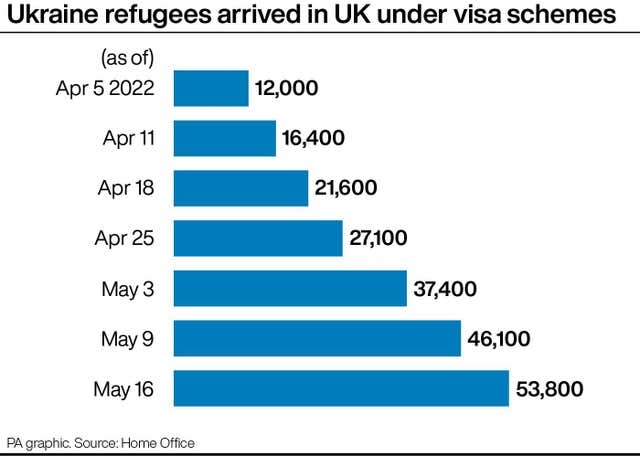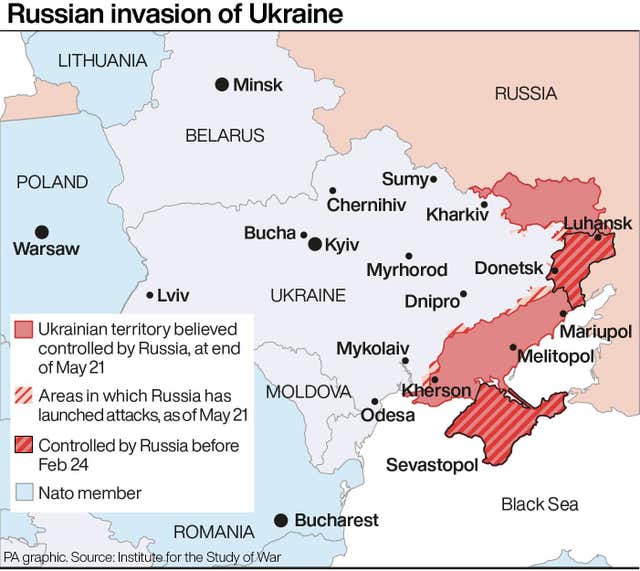Concern mounts over fate of 2,500 Ukrainian POWs from Mariupol steel plant
Russia has claimed full control of the Azovstal steel plant in the city.

Concern is mounting over Ukrainian fighters who became Moscow’s prisoners at the end of a brutal three-month siege in Mariupol – as a Russian-backed separatist leader vowed they would face tribunals.
Russia has claimed full control of the Azovstal steel plant, which for weeks was the last hold-out in Mariupol and a symbol of Ukrainian tenacity in the strategic port city, now in ruins with more than 20,000 residents feared dead.
Its seizure delivers Russian President Vladimir Putin a badly wanted victory in the war he began in February.
As the West rallies behind Ukraine, Polish President Andrzej Duda arrived in Ukraine on an unannounced visit and will address the country’s parliament on Sunday, his office said.
Poland, which has welcomed millions of Ukrainian refugees since the start of the war, is a strong supporter of Ukraine’s desire to join the European Union.
With Russia blocking Ukraine’s sea ports, Poland has become a major gateway for western humanitarian aid and weapons going into Ukraine and has been helping Ukraine get its grain and other agricultural products to world markets.
The Russian defence ministry released video footage of Ukrainian soldiers being detained after announcing that its forces had removed the last hold-outs from the steel plant’s miles of underground tunnels.
Family members of the fighters, who came from a variety of military and law enforcement units, have pleaded for them to be given rights as prisoners of war and eventually returned to Ukraine. Deputy prime minister Iryna Vereshchuk said on Saturday that Ukraine “will fight for the return” of every one of them.
Denis Pushilin, the pro-Kremlin head of an area of eastern Ukraine controlled by Moscow-backed separatists, claimed that 2,439 people were in custody.
He said on Russian state TV that the figure includes some foreign nationals, though he did not provide further details.
“I believe that justice must be restored. There is a request for this from ordinary people, society, and, probably, the sane part of the world community,” Russian state news agency Tass quoted Mr Pushilin as saying.
Convoys of buses, guarded by Russian armoured vehicles, left the plant on Friday.
At least some Ukrainians were taken to a former penal colony, while Russian authorities said others were in hospital.
Among the plant’s defenders were members of the Azov Regiment, whose far-right origins have been seized on by the Kremlin as part of an effort to cast its invasion as a battle against Nazi influence in Ukraine.
The Ukrainian government has not commented on Russia’s claim of capturing Azovstal, which for weeks remained Mariupol’s last hold-out of Ukrainian resistance.

Ukraine’s military had told the fighters that their mission was complete and they could come out. It described their extraction as an evacuation, not a mass surrender.
The end of the battle for Mariupol would help Mr Putin offset some stinging setbacks, including the failure of Russian troops to take over Ukraine’s capital, Kyiv, the sinking of the Russian Navy’s flagship in the Black Sea and the continued resistance that has stalled an offensive in eastern Ukraine.
It also furthers Russia’s quest to essentially create a land bridge from Russia stretching through the Donbas region to the Crimean Peninsula, which Moscow annexed from Ukraine in 2014.
The impact on the broader war remained unclear.
Many Russian troops already had been redeployed from Mariupol to elsewhere in the conflict.
Russian defence ministry spokesman Igor Konashenkov reported on Saturday that Russia destroyed a Ukrainian special-operations base in the Black Sea region of Odesa as well as a significant cache of western-supplied weapons in northern Ukraine’s Zhytomyr region. There was no confirmation from the Ukrainian side.

The Ukrainian military reported heavy fighting in much of the Donbas in eastern Ukraine.
“The situation in Donbas is extremely difficult,” said President Volodymyr Zelensky in his nightly video address to the nation. “As in previous days, the Russian army is trying to attack Sloviansk and Sievierodonetsk.”
He said Ukrainian forces are holding off the offensive “every day.”
Sievierodonetsk is the main city under Ukrainian control in the Luhansk region, which together with the Donetsk region makes up the Donbas. Governor Serhii Haidai said the only functioning hospital in the city has just three doctors and supplies for 10 days.
On Sunday, the British Ministry of Defence said Russia’s only operational company of BMP-T Terminator tank support vehicles, which are designed to protect main battle tanks, “has likely been deployed to the Sievierodonetsk axis of the Donbas offensive”.
It said, however, with a maximum of 10 of the vehicles deployed, “they are unlikely to have a significant impact on the campaign”.
Sloviansk, in the Donetsk region, is critical to Russia’s objective of capturing all of eastern Ukraine and saw fierce fighting last month after Moscow’s troops backed off from Kyiv. Russian shelling on Saturday killed seven civilians and injured 10 more elsewhere in the region, the governor said.
Mr Zelensky emphasised that the Donbas remains part of Ukraine and his forces are fighting to liberate it.

Speaking at a joint media conference with Portuguese Prime Minister Antonio Costa, Mr Zelensky pressed western countries for multiple-launch rocket systems, which he said “just stand still” in other countries yet are key to Ukraine’s success.
US President Joe Biden signed off on Saturday on a fresh, 40 billion dollar (£32 billion) infusion of aid for Ukraine, with half for military assistance.
Portugal pledged up to 250 million euros (£211 million), as well as continued shipments of military equipment.
Mr Zelensky reiterated his intention to apply for European Union membership and accused Russia of blockading agricultural exports from Ukraine, which is known as the “breadbasket of Europe”.
Mariupol, which is part of the Donbas, was blockaded early in the war and became a frightening example to people elsewhere in the country of the hunger, terror and death they might face if the Russians surrounded their communities.
The seaside steelworks, occupying some four square miles, was a battleground for weeks.
Drawing Russian airstrikes, artillery and tank fire, the dwindling group of outgunned Ukrainian fighters held out with the help of airdrops.
Mr Zelensky revealed in an interview published on Friday that Ukrainian helicopter pilots braved Russian anti-aircraft fire to ferry in medicine, food and water to the steel mill as well as to retrieve bodies and rescue wounded fighters.
A “very large” number of the pilots died on the missions, he said, calling them “absolutely heroic”.
The Russian defence ministry on Saturday released video of Russian troops taking into custody Serhiy Volynskyy, the commander of the Ukrainian Navy’s 36th Special Marine Brigade, which was one of the main forces defending the steel plant.
The Associated Press has not been able to independently verify the date, location and conditions of the video.
With Russia controlling the city, Ukrainian authorities are likely to face delays in documenting evidence of alleged Russian atrocities in Mariupol, including the bombings of a maternity hospital and a theatre where hundreds of civilians had taken cover.
Satellite images in April showed what appeared to be mass graves just outside Mariupol, where local officials accused Russia of concealing the slaughter by burying up to 9,000 civilians.
An estimated 100,000 of the 450,000 people who resided in Mariupol before the war remain.
Many, trapped by Russia’s siege, were left without food, water and electricity.
The Ukrainian mayor of Mariupol warned on Saturday the city is facing a health and sanitation “catastrophe” from mass burials in shallow pits across the ruined city as well as the breakdown of sewage systems.
Vadim Boychenko said summer rains threaten to contaminate water sources as he pressed Russian forces to allow residents to safely leave the city.
“In addition to the humanitarian catastrophe created by the (Russian) occupiers and collaborators, the city is on the verge of an outbreak of infectious diseases,” he said on the messaging app Telegram.





